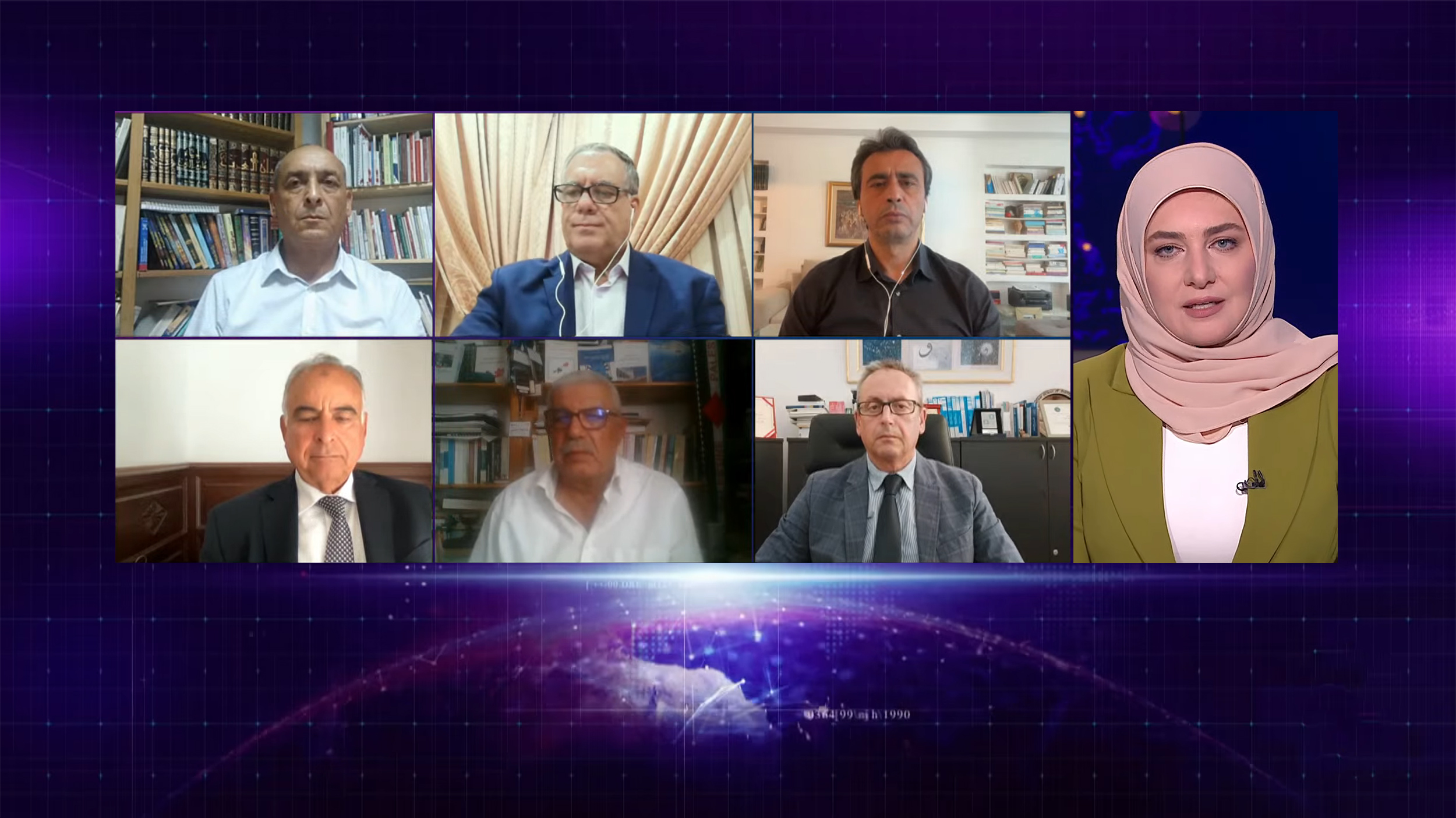
Al Jazeera Centre for Studies hosted a webinar in collaboration with Al Jazeera Mubasher and the Centre for Mediterranean and International Studies (CEMI) in Tunisia on Monday, 15 August 2022, under the title, “Tunisia’s New Constitution: A Solution or An Exacerbation?” The participants were Ghazi Chaouachi, Secretary General of the Democratic Current; Ahmed Driss, Director of the Tunisian School of Politics and President of CEMI; Rabeh Khraifi, academic and former member of the National Constituent Assembly; Abdelatif Hannachi, Professor of Political Thought at Tunis University; Ezzeddine Saidane, economist; Jaouhar Ben Mbarek, Leader of the National Salvation Front. The webinar was moderated by Al Jazeera Mubasher presenter Waad Zakaria.
The webinar forecasted developments in the Tunisian political scene after the referendum on the constitution that took place on 25 July 2022, exacerbating the political crisis and diminishing opportunities for dialogue that could lead to a compromise between President Kais Saied and his opponents.
The participants sought to draw the features of the new republic that Saied seeks to establish and explore how the constitution will contribute to building it as well as the way the president may deal with opponents to his choices and the constitution, which they do not recognise.
In this regard, most participants agreed that the Tunisian political crisis will persist and even worsen due to Saied’s inclination towards establishing a new authoritarian system controlled by a single individual and the elimination of institutions, particularly the parliament and the judiciary, as well as disregard for parties and civil society organisations.
Furthermore, the participants argued that the Tunisian opposition will remain dispersed, lacking a comprehensive vision and unanimous work mechanisms, unless it engages in dialogue to unify its forces and stand united in the face of tireless attempts to restore tyranny in the country.
As for the economic and social crisis and its course and implications, Ezzeddine Saidane warned, “It is likely to become more dangerous in the future and reach a degree that is difficult to control. It could then turn into a social crisis that leads to political turmoil more dangerous than that which Tunisia is currently experiencing.”
Saidane also said, “One of the indicators of this crisis is the government's inability to repay the internal debt since last January,” adding that “all countries that go through similar crises begin to default on the repayment of the internal debt, and then the external debt,” and that “this is expected in Tunisia unless it undertakes the required reforms quickly.”
Moreover, Saidane argued that “the Tunisian economy lost its ability to perform the basic functions of any economy after being unable to achieve growth and create job opportunities.” He pointed out that the Tunisian trade balance deficit reached an unprecedented level in the country's history, after it hit two billion Tunisian dinars per month (1 US dollar = 3.15 Tunisian dinars). This means that the deficit amounted to 14 billion dinars during the last seven months. Even if the situation remains as it is, he said, it will grow to 25 billion dinars by the end of the year. What makes matters more critical is that this deficit can only be paid in foreign currency, which has established its presence in Tunisia. He also explained that the current condition that the economy is in comes in light of the continuous decline of the Tunisian citizens’ purchasing power over the past ten years, at a rate ranging between 40 to 50%, with a steady rise in inflation and the incessant erosion of the middle class, which represents an important factor of political and social stability.
Saidane asserted that these repercussions are the result of the incorrect economic policies adopted in the country since 2011, and that what transpired on 25 July 2022 at the hands of Saied in terms of exceptional procedures did not reflect positively on the economy and social conditions but added to their complexity because nothing has been done to save the economy.
He concluded his remarks by stating that, “the situation is only getting worse due to the absence of domestic and foreign investments now that Tunisia has become an unattractive environment for investment and international credit institutions have given it a negative CCC. This means that, from an economic standpoint, the world sees Tunisia as a country with ‘very high risks’, which will make it difficult for it to deal with foreign countries financially, commercially and economically.”
The webinar concluded that the crisis in Tunisia will be resolved neither through political consensus – if it is even achieved – nor a new constitution that that a section of public opinion thinks will move matters towards detente and ease, but through a comprehensive development strategy, with serious, bold and rapid measures and policies to save the economy; and unless this happens soon, the situation will deteriorate, leading to serious social unrest whose consequences are difficult to predict.
The webinar was broadcast on Al Jazeera Mubasher and live-streamed on AJCS’s social media platforms.